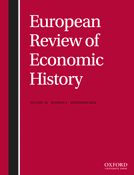
European Review of Economic History
Scope & Guideline
Bridging Economics and History for a Deeper Understanding
Introduction
Aims and Scopes
- Economic Analysis of Historical Events:
The journal focuses on economic analysis of significant historical events, examining how these events shaped economic systems, institutions, and policies over time. - Interdisciplinary Approaches:
Utilizing methodologies from economics, history, sociology, and political science, the journal fosters interdisciplinary research that provides a comprehensive view of economic history. - Regional and Comparative Studies:
The journal emphasizes studies that explore economic history across different regions, allowing for comparative analyses that highlight unique and common trends. - Longitudinal Studies:
Research that spans extensive time periods is a core focus, enabling scholars to investigate long-term economic trends and transformations. - Quantitative and Qualitative Research:
The journal welcomes both quantitative data-driven analyses and qualitative historical narratives, enriching the scholarly discourse in economic history.
Trending and Emerging
- Impact of Technology on Economic Development:
There is an increasing focus on how technological advancements have historically influenced economic development, with studies examining the effects of innovations from the Industrial Revolution to modern times. - Social Inequality and Economic History:
Research exploring themes of social inequality, including gender, race, and class disparities, is gaining traction, highlighting the intersections between economic history and social justice. - Historical Analysis of Crises:
Papers analyzing economic crises—such as the Great Depression, hyperinflation, and pandemics—are trending, providing insights into how past crises inform current economic policies and practices. - Migration and Economic Impact:
The exploration of migration patterns and their economic implications is emerging as a significant theme, reflecting contemporary global migration issues and their historical roots. - Environmental Economics and Historical Contexts:
The integration of environmental factors into economic history studies is on the rise, as scholars seek to understand historical economic practices in the context of climate change and sustainability.
Declining or Waning
- Focus on Traditional Economic Metrics:
There is a noticeable decline in papers centered around traditional economic metrics such as GDP and inflation rates, as researchers increasingly gravitate towards more nuanced analyses involving social and political dimensions. - Colonial Economic Studies:
While still relevant, the frequency of papers specifically addressing colonial economic frameworks and their direct impacts has waned, indicating a potential shift towards broader global economic themes. - Narrowly Defined National Histories:
Research that focuses solely on national histories without comparative or transnational perspectives is becoming less common, as scholars seek to integrate global contexts into their analyses. - Studies on Pre-Industrial Economies:
Although foundational, the exploration of pre-industrial economies appears to be declining, possibly as the field moves towards more contemporary economic issues and their historical implications.
Similar Journals
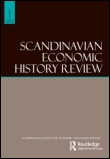
SCANDINAVIAN ECONOMIC HISTORY REVIEW
Connecting History and Economics for a Deeper UnderstandingSCANDINAVIAN ECONOMIC HISTORY REVIEW, published by ROUTLEDGE JOURNALS, TAYLOR & FRANCIS LTD, stands as a significant scholarly platform dedicated to the exploration and analysis of economic history within the Scandinavian context. With an ISSN of 0358-5522 and an E-ISSN of 1750-2837, this journal has been publishing high-quality research since 1953 and continues its contribution to academia with a projected publication span extending to 2024. Renowned for its rigorous scholarship, the journal enjoys a commendable standing in the academic community, reflected in its Q1 classification in History and its competitive rankings across multiple categories. The journal particularly champions transdisciplinary approaches, encouraging researchers to engage with economic history through various lenses including the arts, humanities, and social sciences. Despite operating on a traditional access model, the impactful content delivered within its pages offers invaluable insights for researchers, professionals, and students striving to deepen their understanding of the economic transformations in Scandinavian societies.

REVUE HISTORIQUE
Bridging Time through Rigorous Historical AnalysisREVUE HISTORIQUE is a distinguished scholarly journal dedicated to the field of history, published by PRESSES UNIV FRANCE. With an ISSN of 0035-3264 and an E-ISSN of 2104-3825, this journal has been a vital resource for historians and academics since its inception, exploring various dimensions of historical research and discourse. The journal is currently categorized in the Q3 quartile for history according to the 2023 metrics, highlighting its significance and academic rigor, although it is rated in the 19th percentile in the Scopus Ranks among Arts and Humanities journals. Based in France, the journal encompasses a wide range of historical topics and serves as a platform for innovative research, critical analysis, and scholarly discourse, making it an essential read for anyone looking to deepen their understanding of the past. Researchers, professionals, and students alike will benefit from its comprehensive articles, which reflect the latest trends and developments in historical research. As a non-open access journal, subscribers and institutional access are essential to engage with its rich content.
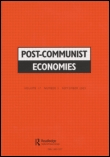
POST-COMMUNIST ECONOMIES
Analyzing the Pathways of Economic Evolution in Former Communist StatesPOST-COMMUNIST ECONOMIES is a leading academic journal dedicated to the exploration and analysis of economic transformations in post-communist societies, published by Routledge Journals, Taylor & Francis Ltd. With an Impact Factor that underscores its influence, this journal is ranked in the Q2 category of Economics and Econometrics for 2023, placing it among the top 25% of its field. It holds a respectable position in Scopus rankings, rated #181 out of 716 in its category, reflecting its commitment to high-quality, rigorous research and discourse. The journal publishes articles that delve into the economic, social, and political challenges faced by transitioning economies, promoting a multidisciplinary dialogue among researchers, practitioners, and policymakers alike. With its open access options and an extensive publication history spanning from 1999 to 2024, POST-COMMUNIST ECONOMIES serves as a vital resource for anyone interested in understanding the dynamics of economic change in the post-communist context, fostering a deeper comprehension of the global economic landscape.
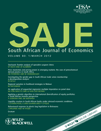
SOUTH AFRICAN JOURNAL OF ECONOMICS
Exploring the dynamics of local and global economies.The South African Journal of Economics, published by Wiley, has been a cornerstone in the field of economics since its inception in 1933. With its ISSN 0038-2280 and E-ISSN 1813-6982, this esteemed journal serves as a vital platform for researchers and scholars to disseminate innovative economic research and theory, while also engaging in critical discussions relevant to both local and global contexts. The journal has consistently ranked within the Q3 category in Economics and Econometrics, showcasing its contribution to the academic community, as reflected in its Scopus ranking of #328/716 in the subject area. Although it does not currently offer Open Access options, the journal remains dedicated to advancing economic thought and analysis through rigorous peer-reviewed articles that cover a broad range of topics. With a commitment to excellence and relevance, the South African Journal of Economics continues to attract a diverse readership of researchers, professionals, and students seeking to deepen their understanding of economic phenomena and policy implications.

Econ Journal Watch
Empowering Economists Through Critical Analysis and Insight.Econ Journal Watch is an esteemed scholarly publication dedicated to advancing the field of economics through critical analysis and discourse. Established by the Institute for Spontaneous Order Economics, this journal aims to provide a platform for researchers, professionals, and students to examine and reflect on contemporary economic issues and theories. With an ISSN of 1933-527X and an E-ISSN of 1933-527X, it has positioned itself within the competitive realm of economics and econometrics. As part of the Q4 category in the 2023 rankings for Economics and Econometrics, the journal is indexed on Scopus, ranking at #569 out of 716 institutions, placing it within the 20th percentile. Although it currently maintains a non-Open Access model, it offers valuable insights and rigorous analysis from 2008 to 2024, contributing significantly to the discourse in economics. The journal’s commitment to fostering a deeper understanding of economic principles makes it an essential resource for anyone engaged in the economic field.

Revista de Historia Industrial
Decoding the Dynamics of Economic ChangeRevista de Historia Industrial, published by UNIV BARCELONA, DEPT HISTORIA, INST ECONOMIQUES, is a premier journal dedicated to the field of industrial history. With a proud ISSN of 1132-7200 and E-ISSN 2385-3247, this esteemed publication has been instrumental in shaping scholarly discourse since its inception in 1996, notably covering a wide array of topics related to industrial development, economic transitions, and historical methodologies through its issues published from 2011 to 2024. Distinguished by its Q1 ranking in History and its influence reflected in a 73rd percentile position among arts and humanities journals, the journal facilitates access to valuable insights for researchers, professionals, and students alike. While it is not an open access journal, its commitment to rigorous academic standards and insightful analyses ensures its relevance in the ever-evolving field of industrial history, providing an essential platform for the exchange of knowledge and innovative research. The journal's multi-faceted scope also intersects with the history and philosophy of science, making it a vital resource for interdisciplinary studies as well.
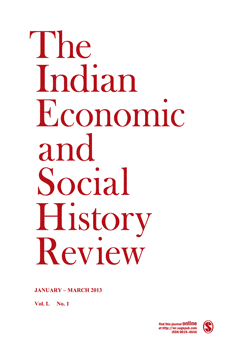
INDIAN ECONOMIC AND SOCIAL HISTORY REVIEW
Navigating the Historical Footprints of India's Economic GrowthINDIAN ECONOMIC AND SOCIAL HISTORY REVIEW, published by SAGE PUBLICATIONS INDIA PVT LTD, stands as a pivotal platform in the fields of economics, history, and social sciences. With an ISSN of 0019-4646 and E-ISSN 0973-0893, this journal has been documenting the evolution of India's socioeconomic landscape since its inception in 1963 and will continue to do so until 2024. Despite its current Q4 ranking in Economics and Econometrics, the journal proudly holds a Q3 ranking in History, emphasizing its enriched content that appeals to a diverse audience of scholars and practitioners. Although not an open-access publication, it provides valuable, peer-reviewed research that contributes significantly to the academic discourse. With its Scopus rankings indicating a respectable 80th percentile in History, the journal is a key resource for understanding the nuanced interplay of economic and social factors throughout India's history. Researchers, students, and professionals alike will find this journal an essential reference point for advancing their understanding of historical economic trends and social dynamics.
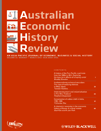
AUSTRALIAN ECONOMIC HISTORY REVIEW
Bridging History and Economics for Informed Analysis.The Australian Economic History Review, published by Wiley, is a premier journal dedicated to advancing the field of economic history through rigorous research and insightful analyses. With an ISSN of 0004-8992 and an E-ISSN of 1467-8446, this journal has established itself as a critical resource for scholars and practitioners alike, with a notable Scopus ranking that places it in the 85th percentile among History journals and provides a complementary perspective in Economics and Econometrics fields. Since its inception in 1974, it has provided a platform for innovative research, fostering discussions that span Australian economic developments and their global contexts. Although it offers limited Open Access options, the journal remains a vital source of information for those seeking to understand the intricate dynamics of economic processes through historical lenses. Researchers, professionals, and students are encouraged to engage with the rich content that contributes significantly to both academic scholarship and practical implications in economic historiography.
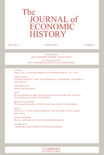
JOURNAL OF ECONOMIC HISTORY
Discovering the Legacy of Economic ThoughtJOURNAL OF ECONOMIC HISTORY, published by Cambridge University Press, is a renowned academic platform dedicated to the exploration and analysis of economic history from its inception in 1941 through the forthcoming decades. With its ISSN 0022-0507 and e-ISSN 1471-6372, this journal occupies a prestigious place in the field, as evidenced by its impressive Q1 rankings in both Economics and Econometrics and History categories for 2023. It is positioned among the top tier of journals, ranking #42 out of 1760 in the Arts and Humanities (History) and #75 out of 242 in Economics, Econometrics, and Finance (Miscellaneous) according to Scopus metrics. The journal's rigorous peer-reviewed articles aim to bridge theoretical frameworks with empirical research, fostering an understanding of historical economic dynamics and their relevance in contemporary society. Although the journal does not offer open access, it continues to serve as an essential resource for researchers, professionals, and students aiming to deepen their knowledge and contribute to critical discussions within the fields of economics and history. The journal publishes diverse articles that engage critically with both primary and secondary sources, ensuring that its contributions remain impactful and influential within the academic community.

Cliometrica
Illuminating Historical Trends through Quantitative MethodsCliometrica, published by Springer Heidelberg, is a prestigious journal that has made significant contributions to the fields of Economics and Econometrics as well as History. With an impressive 2023 Scopus ranking placing it in the Q2 category for Economics and Econometrics and the Q1 category for History, this journal stands out as an essential resource for researchers, professionals, and students alike. Known for its rigorous scholarly approach, Cliometrica merges quantitative and qualitative methodologies to uncover insights into historical economic analysis, reflecting the interdisciplinary nature of contemporary research. With access strictly through subscription, it continues to uphold high academic standards, making it a vital addition to any academic library. Published in Germany, Cliometrica serves as a key platform for advancing the discussion and understanding of historical econometric techniques, ensuring its relevance and importance in both historical and economic research circles.